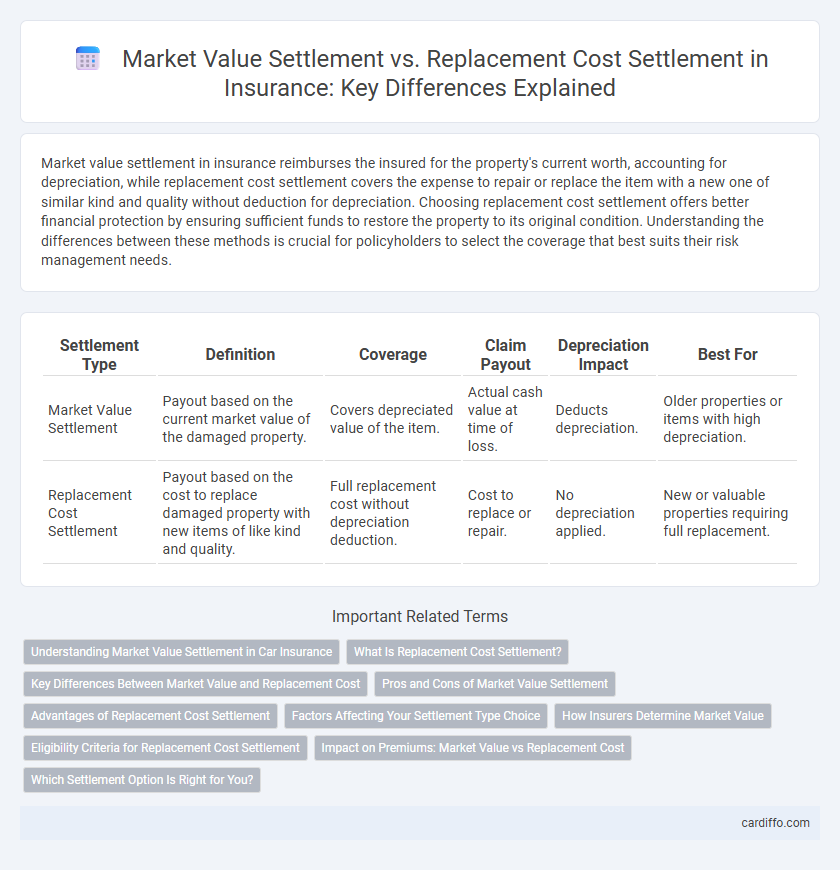Market value settlement in insurance reimburses the insured for the property's current worth, accounting for depreciation, while replacement cost settlement covers the expense to repair or replace the item with a new one of similar kind and quality without deduction for depreciation. Choosing replacement cost settlement offers better financial protection by ensuring sufficient funds to restore the property to its original condition. Understanding the differences between these methods is crucial for policyholders to select the coverage that best suits their risk management needs.
Table of Comparison
| Settlement Type | Definition | Coverage | Claim Payout | Depreciation Impact | Best For |
|---|---|---|---|---|---|
| Market Value Settlement | Payout based on the current market value of the damaged property. | Covers depreciated value of the item. | Actual cash value at time of loss. | Deducts depreciation. | Older properties or items with high depreciation. |
| Replacement Cost Settlement | Payout based on the cost to replace damaged property with new items of like kind and quality. | Full replacement cost without depreciation deduction. | Cost to replace or repair. | No depreciation applied. | New or valuable properties requiring full replacement. |
Understanding Market Value Settlement in Car Insurance
Market Value Settlement in car insurance refers to the insurer compensating the policyholder based on the current market value of the vehicle at the time of loss, reflecting depreciation and wear. This settlement method considers factors like vehicle age, condition, mileage, and local demand to determine the payout amount. Understanding Market Value Settlement helps policyholders anticipate realistic compensation compared to Replacement Cost Settlement, which covers the expense of buying a new vehicle of similar make and model without depreciation deductions.
What Is Replacement Cost Settlement?
Replacement Cost Settlement refers to an insurance payout method that reimburses the policyholder for the full cost of repairing or replacing damaged property without deducting depreciation. This type of settlement ensures coverage for the current market price of new materials and labor required to restore the property to its original condition. It contrasts with Market Value Settlement, which considers the depreciated value, resulting in lower compensation.
Key Differences Between Market Value and Replacement Cost
Market value settlement reimburses the insured based on the current worth of the property, factoring in depreciation and wear, while replacement cost settlement covers the full expense to repair or replace the damaged item without deduction for depreciation. Market value policies typically result in lower payout amounts after a loss, whereas replacement cost policies offer higher financial protection and better restoration potential. Understanding these distinctions is crucial for selecting appropriate coverage and ensuring adequate compensation after an insured event.
Pros and Cons of Market Value Settlement
Market Value Settlement offers the advantage of paying the insured the current market worth of the damaged property, providing a quick and straightforward claim process without the need for extensive repairs or replacements. However, this method often results in lower compensation compared to Replacement Cost Settlement, potentially leaving policyholders undercompensated, especially in areas with rapidly rising property values. The risk of depreciation significantly affects the payout, which may not reflect the actual cost required to rebuild or replace the insured asset.
Advantages of Replacement Cost Settlement
Replacement Cost Settlement provides insured parties with full coverage to repair or replace damaged property without deducting depreciation, ensuring restoration to original condition. This method eliminates out-of-pocket expenses that often arise with Market Value Settlement, which adjusts compensation based on property depreciation. Policyholders benefit from more comprehensive protection and financial stability, especially for homes and valuable assets.
Factors Affecting Your Settlement Type Choice
Choosing between Market Value Settlement and Replacement Cost Settlement depends heavily on factors such as the age, condition, and depreciation of the insured property. Replacement Cost Settlement covers the full expense to repair or replace damaged items without deduction for depreciation, making it ideal for newer or well-maintained assets. Market Value Settlement reflects the current value considering wear and tear, which might benefit owners of older properties but can result in lower payout amounts.
How Insurers Determine Market Value
Insurers determine market value settlement by assessing the current worth of the property considering depreciation, age, and overall condition rather than the cost to replace it. This approach involves analyzing comparable sales data, local market trends, and the property's current economic value to establish a fair compensation amount. Market value settlements typically result in lower payouts compared to replacement cost settlements, which cover the full cost to rebuild or replace damaged property without factoring in depreciation.
Eligibility Criteria for Replacement Cost Settlement
Replacement Cost Settlement eligibility requires policyholders to have a homeowner's insurance policy with replacement cost coverage specifically included. The property must be repaired or replaced with materials of like kind and quality within the insurer's specified timeframe to qualify for full reimbursement. Insurers often mandate documented proof of repairs or replacement costs before approving the claim under replacement cost settlement.
Impact on Premiums: Market Value vs Replacement Cost
Market value settlement typically results in lower insurance premiums because it reimburses the depreciated value of the property at the time of loss, reflecting current market conditions. Replacement cost settlement often leads to higher premiums since it covers the full cost of repairing or replacing damaged property with new materials, regardless of depreciation. Insurers factor in these differing risk exposures and potential claim amounts when calculating premiums, making replacement cost policies more expensive but providing broader financial protection.
Which Settlement Option Is Right for You?
Choosing between Market Value Settlement and Replacement Cost Settlement depends on your priority for coverage and financial risk tolerance. Market Value Settlement reimburses based on the current value of the property, accounting for depreciation, making it suitable for those seeking lower premiums with potential out-of-pocket costs. Replacement Cost Settlement covers the full cost to repair or replace damaged property without depreciation, ideal for policyholders wanting comprehensive protection and peace of mind.
Market Value Settlement vs Replacement Cost Settlement Infographic

 cardiffo.com
cardiffo.com